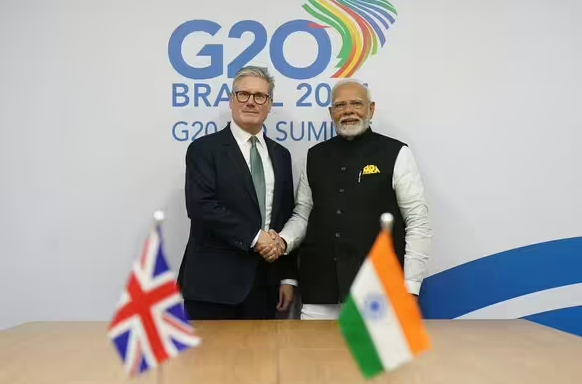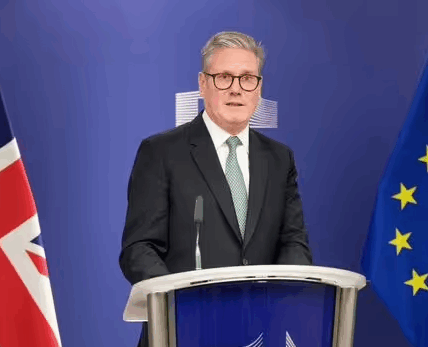Huge growth for the British economy as landmark agreement signed that will boost exports and slash tariffs

Sir Keir Starmer with Indian prime minister Narendra Modi when they met in 2024 (Image: Getty)
A bumper Brexit trade deal with India has been agreed in a massive boost for the UK’s economy. Sir Keir Starmer hailed “a new era for trade and the economy” as he celebrated that landmark agreement that will help British employers sell their products in India, and cut prices in UK shops.
India is the world’s fourth-largest economy with a GDP of £4.2trillion. With a population of 1.4billion, it also has high levels of poverty but a growing middle class hungry for overseas goods. The deal is the culmination of work that began under the previous Conservative government, when current Tory leader Kemi Badenoch held negotiations in India in her role as trade secretary. It will add £4.8billion to the UK economy, the Government said.
Don’t miss…
Labour mutiny as MPs return to Westminster after Reform election triumph [LATEST]
Keir Starmer ‘forced into winter fuel payment U-turn’ after election disaster [LATEST]
Fresh nightmare for Starmer as Trump declares films made in UK ‘security threat’ [LATEST]
Tenants are working 125 days every year just to pay their landlord [LATEST]
Business and Trade Secretary Jonathan Reynolds said: “By striking a new trade deal with the fastest-growing economy in the world, we are delivering billions for the UK economy and wages every year and unlocking growth in every corner of the country, from advanced manufacturing in the North-east to whisky distilleries in Scotland. “
Taking to X, formerly Twitter, President Modi branded it an “historic milestone”.
The leader of the world’s most populous country said: “India and the UK have successfully concluded an ambitious and mutually beneficial Free Trade Agreement, along with a Double Contribution Convention. These landmark agreements will further deepen our Comprehensive Strategic Partnership, and catalyse trade, investment, growth, job creation, and innovation in both our economies.
He added that Keir Starmer will be visiting India soon to formally sign the deal.
Indian tariffs on key products such as whisky, cosmetics and medical devices will be slashed, with 85% of affected goods becoming tariff-free within a decade.
Whisky and gin tariffs will be halved from 150% to 75% before reducing to 40% by year 10 of the deal, while automotive tariffs will go from over 100% to 10% under a quota.
Other goods with reduced tariffs, which can open markets and make trade cheaper for businesses and Indian consumers, include cosmetics, aerospace, lamb, medical devices, salmon, electrical machinery, soft drinks, chocolate, and biscuits.
British shoppers could see cheaper prices and more choice on products, including clothes, footwear, and food products including frozen prawns as the UK liberalises tariffs.
The deal is expected to increase bilateral trade by £25.5billion, UK GDP by £4.8billion and wages by £2.2billion each year in the long run.
Sir Keir said: “We are now in a new era for trade and the economy. That means going further and faster to strengthen the UK’s economy, putting more money in working people’s pockets.
“Through this Government’s stable and pragmatic leadership, the UK has become an attractive place to do business. Today we have agreed a landmark deal with India – one of the fastest growing economies in the world, which will grow the economy and deliver for British people and business.”
In addition, India has agreed measures to make trade easier including publishing customs procedures and laws online in English.
Enhanced copyright protections for the creative sector will give exporters confidence thanks to a commitment that their work will continue to be protected for at least 60 years.
British shoppers are expected to enjoy access to a greater variety of clothes and shoes.
The UK has been free to sign its own trade deals across the world since leaving the European Union in 2020. In 2024, it joined the Comprehensive and Progressive Agreement for Trans-Pacific Partnership (CPTPP), a trade agreement involving Australia, Brunei, Canada, Chile, Japan, Malaysia, Mexico, New Zealand, Peru, Singapore and Vietnam.
In addition, new trade deals have been signed with Japan, Australia and Norway, Iceland and Liechtenstein, while the UK has agreed trading arrangements mirroring those that existed as members of the EU with hundreds of other countries.
It comes as the UK continues efforts to convince Donald Trump to cut tariffs on British exports, including a 25% fee charged on motor vehicles. The US president dealt another blow by announcing a 100% tariff on films made overseas, which appears to include Hollywood blockbusters created by US studios but filmed in the UK.
Responding to today’s major trade news, the Tories‘ Andrew Griffith welcomed the deal.
The Shadow Trade Secretary said: “It’s good to see the Government recognise that reducing cost and burdens on businesses in international trade is a good thing, and that thanks to Brexit we can do.”
“But it would be even better if they would apply the same reasoning to our domestic economy, where they remain intent on raising taxes, energy costs and regulatory burdens.”
Don’t miss…
Top Tory urges MPs ‘don’t blame Kemi’ after local elections disaster [LATEST]
Reform pledges to restore winter fuel payments by slashing foreign aid [LATEST]
Desperate Starmer could reverse winter fuel cuts by Christmas [LATEST]
Keir Starmer accused of ‘panic’ as Labour plans ‘smear campaign’ against Farage [LATEST]
The “transformational” India deal was welcomed by Mark Kent, chief executive of the Scotch Whisky Association.
He said: “The UK-India free trade agreement is a once-in-a-generation deal and a landmark moment for Scotch whisky exports to the world’s largest whisky market. It shows that the UK Government is making significant progress towards achieving its growth mission, and the Scotch whisky industry looks forward to working with the UK and Indian governments in the months ahead to implement the deal, which would be a big boost to two major global economies during turbulent times.”
Premier League chief executive Richard Masters said: “The continued growth of the Premier League and UK businesses in India will have a positive impact on our domestic economy and we welcome the news of this new trade deal secured by Government, which will support UK businesses operating in India.”
Saif Malik, UK chief executive at global bank Standard Chartered, said: “The UK-India Free Trade Agreement is a significant achievement. It will create new opportunities for UK and Indian businesses, enable greater access to one of the world’s largest and most dynamic markets, and drive growth and innovation across the UK-India corridor. We welcome this strong commitment to partnership and prosperity.”





